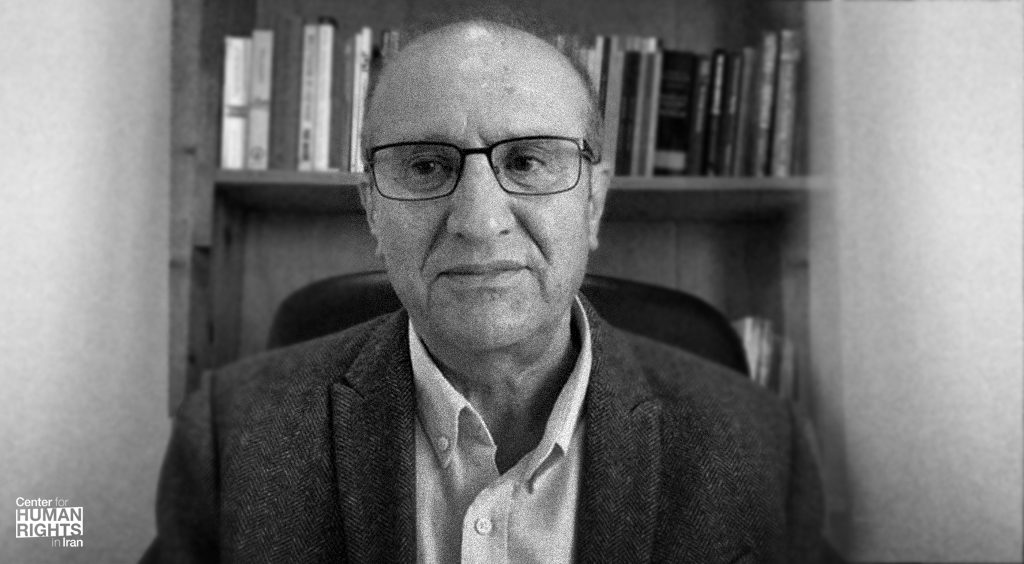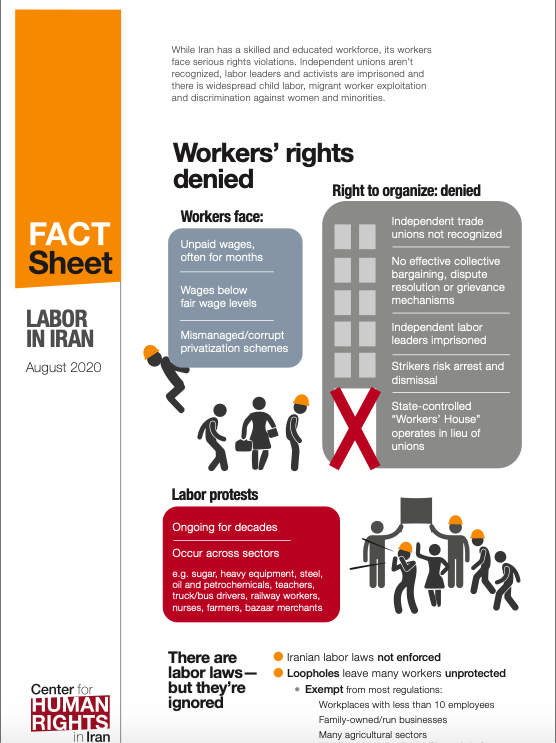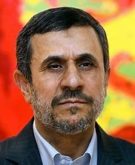CHRI – A grassroots teachers’ rights movement is gaining steam in Iran, where large street protests by teachers are increasingly sprouting across the country. “In Iran’s current economic situation, the financial burden on the teaching community is terrible,” said Sattar Rahmani, the author of several Persian-language books and articles on the movement, in an interview with the Center for Human Rights in Iran (CHRI). “It’s so bad that even a second job is not going to cover their living expenses.”

The most organized labor sector in the country, Iran’s teachers have outlined a list of demands including fair and increased salaries, the release of jailed teachers’ rights advocates, and keeping school free for all Iranian children. Yet the Iranian government could continue to ignore these demands because it has the means to either placate the movement or violently suppress it, according to Rahmani, who was a teacher and member of the Iranian Teachers Trade Association before becoming a political prisoner and leaving Iran in the 1980s.
That said, suppressing the teachers’ protests would be a “great risk for the regime,” said Rahmani, who’s now based in the UK. “If the ruling establishment crushes the teachers’ movement in the same way it suppressed the farmers’ protests in Isfahan, it would reach the end of the road… All the students and their families would pour into the streets. They would not allow bullets to be fired at their teachers.”
Following is CHRI’s translation of the interview, which was initially conducted in Persian.
CHRI: Why are teachers all across Iran increasingly protesting in the streets?
Rahmani: The latest round of protests and strikes have been larger compared to 5-10 years ago because of the constant pressures on the Iranian Teachers Trade Unions Coordination Council (ITTUCC) in recent years. The council has two representatives from 22 of Iran’s [31] provinces. The representatives, who are in contact with their local members, were under pressure for not pursuing teachers’ demands. The representatives were getting a lot of messages from teachers that accused the council of being passive and impotent. All these pressures on the council resulted in the organization of bigger protests.
CHRI: How is Iran’s economic situation impacting teachers?
Rahmani: The reason why grassroots groups are putting pressure on the trade associations is that financially teachers are having a difficult time. In Iran’s current economic situation, the financial burden on the teaching community is terrible. It’s so bad that even a second job is not going to cover their living expenses.
Recently, there have been larger protest gatherings by teachers in various cities, especially in Shiraz, because living expenses have become a tragic problem. I’m sure that the continuation of the current economic situation will lead to wider protests, especially as other suffering sectors of society join the rallies. There is no doubt that the economic problems are having a direct and obvious impact on teachers as well as the students. On the other hand, privatization of schools has become another method of extortion against teachers and students. For instance, in many cases, teachers working for non-public schools have been forced to accept 500,000 tomans ($18.7 USD free-market rate or $117.6 official Central Bank rate) per month while their contract is for five million tomans ($187 free-market rate or $1,176 USD official Central Bank rate). Also, they must pay for their own health insurance. There are 160,000 teachers working for non-public or private schools. It’s tragic that they must work under such conditions. I think if this situation continues, the protests will grow.
CHRI: What are the teachers demanding?
Rahmani: In the beginning, they were seeking changes to their salary pay scales. This issue goes back to a decade ago. Since then, every government has passed teachers’ demands onto the next. Too many years have gone by, and the teachers are more determined than ever to get this done. That’s why in their slogans they emphasize the “full” implementation of the pay-scale regulations for teachers. The teachers want a salary increase equal to 80 percent of the level paid to university academics. Another important demand is free education in accordance with Article 30 of the Constitution. Teachers have a responsibility to protect students. During the pandemic, three million students have been dislodged from the education system. Many of these children have become child laborers, absorbed by underground factories, or are collecting garbage. Teachers feel responsible in these situations.
Teachers are also insisting on the implementation of safety measures in schools. We should recall the fire that burned down the elementary school in the village of Shinabad [in December 2012], killing and seriously injuring several students. Since then, survivors have only heard promises of government assistance but nothing has been done for their rehabilitation.
Other demands include freedom of association, the right to protest under Article 27 of the Constitution without government interference, and the right to hold national conferences.
Meanwhile, the participation of retired teachers has made the protests more significant. What the retirees are experiencing is the eventual fate of today’s teachers. The education system’s retirees are living in extreme poverty. Their demands are the demands of all retirees in the country. They want their pension to be about 90 to 95 percent of the salary of employed teachers.
CHRI: How have students been impacted?
Rahmani: I was really impressed by a speech given by a student during recent protests. He said, “You taught us how to live. You taught us the best lesson, that to have a better life we must struggle … We must take our rights. That’s the best lesson I’ve learned.”
Ninety percent of the 15 million students in public schools are from working-class families or the margins of society. They understand what the teachers are going through because they are suffering as well. We have students who go to school in the morning and work evenings in order to meet their living and education expenses. When these students see their teacher working as a taxi driver after school, they understand his pain. They see he’s tired and in no mood to talk. Under these circumstances, education becomes meaningless.
Teachers also want to improve the quality of education by reducing the number of students per classroom. The standard number is 15 to 18 but what we have in Iran’s public schools is an average of 30 or 40 students per classroom.
Unfortunately, the deteriorating economic situation has corrupted the education system. We see undergraduate and graduate degrees being openly bought and sold. Often we see students being given passing grades when parents make a “donation.” This tells students that the purpose of education is simply to get a degree, not to improve awareness or gain social and cultural knowledge.

CHRI: Some labor activists in Iran argue that teachers and workers are in separate movements and don’t share important common ground. What is your opinion?
Rahmani: For a long time in Europe, the term used for teachers was “education workers.” They see teachers as part of the working class. But in Iran, this definition has not been generally accepted yet. Teachers are still viewed as separate from the working class.
The term “education workers” for teachers is very appropriate because the underlying social, political and economic conditions of workers and teachers are the same. They can succeed if they join forces but there are differences that cause rifts between them. It’s wrong for teachers to say workers’ problems have nothing to do with their problems. But it must be said that these tendencies will soon change. More will support the view that teachers are part of the working class and they cannot gain their rights on their own.
CHRI: What does the future look like for teachers in Iran?
Rahmani: As the quality of education drops and the system becomes more corrupt, we will see an increase in social ills. The increase in the number of child laborers is the result of this deterioration in the quality of education. When students come out of this corrupt education system, and pay money to buy their university degree, they won’t have the ability to work properly and professionally. They will join the vast ocean of the unemployed. At the same time, we see many who study hard and excel in their education but in the end they find jobs in sectors that have no connection with their expertise.
The ruling establishment is responsible for all the social ills because it continues to pursue policies that are adding to economic problems and dragging society toward greater poverty and misery. Many of these social ills cannot be overcome because they are rooted in the actions of a regime run by torturers and oppressors. Many authoritarian states have taken this road.
Looking at the existing conditions, we will see a social catastrophe in the near future. The ruling establishment is making it happen sooner.
CHRI: How has the Iranian government responded to the teachers’ protests?
Rahmani: The ruling establishment has two choices. Either it must try to meet the teachers’ demands and attend to their issues, or resort to various methods to silence and suppress them.
There were lots of promises made before Parliament recently ratified the budget for teachers’ salaries for next year [starting in the Persian calendar year of March 2022]. It became clear that the regime has other priorities. Look at the 180 percent increase in the budget for religious seminaries, or the 126 percent increase in the budget for the publication of Imam Khomeini’s [founder of the Islamic Republic] works, or the 42 percent increase of funds for women’s religious seminaries, and many other examples that have no relevance to the issues facing our society today. In fact, some of them are harmful to society. At the same time, there have been budget increases for the military and oppressive agencies inside the country, as well as for the Islamic Republic’s proxy forces in the region. When we look at the issue from this perspective, the ruling establishment’s message is clear: We will crush the teachers; there’s no other alternative.
In reality, the budget is designed to maintain the status quo, not to encourage social growth or progress. The regime is willing to spend 12 trillion tomans ($450 million USD free-market rate – $2.9 billion USD official Central Bank rate) to increase teachers’ salaries to appease some of them and make them retreat, which means it has the ability, and the necessary funds, to suppress the remaining protesting teachers.
CHRI: Can you explain this in more detail?
Rahmani: The budget approved for teachers’ salaries was half of the proposed amount. The ITTUCC challenged this decision and called on teachers to continue their protests. But more important than that is neutralizing the parallel organizations affiliated with the state. For instance, the Islamic Society of Teachers led by Faraj Komeyjani claims to be negotiating with the authorities on behalf of the teachers’ movement, even though (senior ITTUCC member) Rasoul Bodaghi recently reminded Komeyjani that he isn’t in a position to be a spokesperson for the teachers. These parallel organizations have been created to divide the teachers’ ranks.
In my opinion, any retreat by the teachers at this stage would be a kind of suicide. That’s what the ruling establishment wants. The teachers’ movement should follow a path to gain the support of other civil rights and labor movements, such as the Haft Tappeh [sugar mill] workers, the retirees in other sectors, the Free Workers Union of Iran, the Union of Workers of the Tehran and Suburbs Bus Company, steel and auto workers, as well as other labor organizations. If these unions and organizations issue a joint statement in support of the teachers’ movement, it could be a turning point. That said, the latest teachers’ protests are considered a turning point by themselves.
The teachers’ movement will unite with other movements when it shifts its attention from the education system to common issues facing the families of students and workers. This will create a stronger bond between a vast segment of society that is suffering from all kinds of economic problems.
Free education, free healthcare, and a dignified life are key points that could unite teachers with other movements and finally tip the balance of power in favor of the people.
CHRI: Teachers have loudly called for the release of their imprisoned colleagues at recent protests. Are their calls falling on deaf ears?
It will have a big impact. [Imprisoned teachers’ rights advocate] Esmail Abdi told me whenever prison officials treated him nicely it was because something had happened outside the prison. In other words, the authorities know that imprisoning important figures is a sensitive issue that can raise a lot of attention inside and outside the country and in the international community.
For example, Education International is an organization consisting of teachers’ unions from 170 countries. It has issued statements condemning the Islamic Republic’s treatment of teachers and Esmail Abdi’s continued imprisonment. It has called for the freedom of all imprisoned teachers in Iran and asked all members to take a stand and put pressure on their governments to protest against Iran’s human rights violations. This will surely have an impact.
In the teachers’ protests in Shiraz, a sea of people chanted for the freedom of imprisoned teachers and emphasized they would not tolerate the incarceration and bogus prosecution of any teacher. Yet at the same time, the security forces violently attacked and arrested Rasoul Bodaghi [at protests in December 2021] and the regime propaganda machine tried to inject its own narrative of the teachers’ protests. The Kayhan newspaper [conservative] labeled the ITTUCC a “cult,” and we know what they are inferring by using that kind of terminology. They want to write scenarios against ITTUCC activists and fabricate cases against them, accusing them of collaboration with “foreign enemies” as an excuse to suppress the teachers’ protests.
In my opinion, if the ruling establishment crushes the teachers’ movement in the same way it suppressed the farmers’ protests in Isfahan, it would reach the end of the road. All the students and their families would pour into the streets. They would not allow bullets to be fired at their teachers. Suppressing the teachers’ protests would be a great risk for the regime.
CHRI: How would you compare workers’ movements in the UK, where you are based now, to this workers’ movement in Iran?
Rahmani: In many countries, non-governmental organizations are able to freely operate. The International Labor Organization has recognized the right of workers to unionize and conduct collective bargaining, without state interference.
In 2003, I was in charge of the north London branch of the University and College Union (UCU) and took part in a number of protests and strikes. Our only problem was that we weren’t getting paid for the days that we were on strike. There was no police action, no arrests, no restrictions. We had the right to gather and chant against the authorities. This isn’t possible in Iran. You will be arrested and jailed.
Another important difference is that teachers’ organizations in many countries pay attention to internal issues facing their members as well, such as mental health problems, sexual discrimination, corporal punishment, humiliation of students by teachers or vice versa, etc.
Also, the unions are in charge of ensuring the implementation of safety measures and carrying out inspections in schools. There are union representatives who will directly communicate with teachers and hear their criticisms and give advice on how to gain their rights without any fear.
In addition, union members have access to free legal counseling if they need help regarding a judicial matter. There are many kinds of services available to members, which shows how unions in these counties operate with so much attention to the rights of teachers and educational affairs.
Read this interview in Persian
 Shabtabnews In this dark night, I have lost my way – Arise from a corner, oh you the star of guidance.
Shabtabnews In this dark night, I have lost my way – Arise from a corner, oh you the star of guidance.



